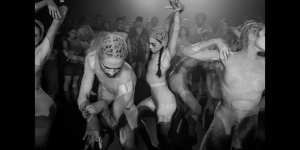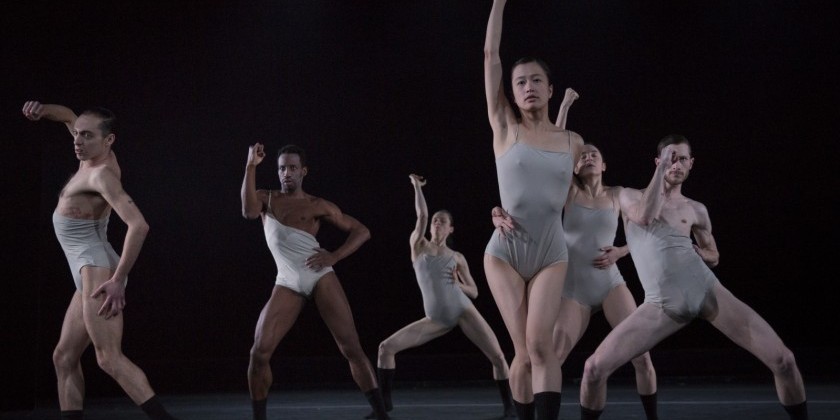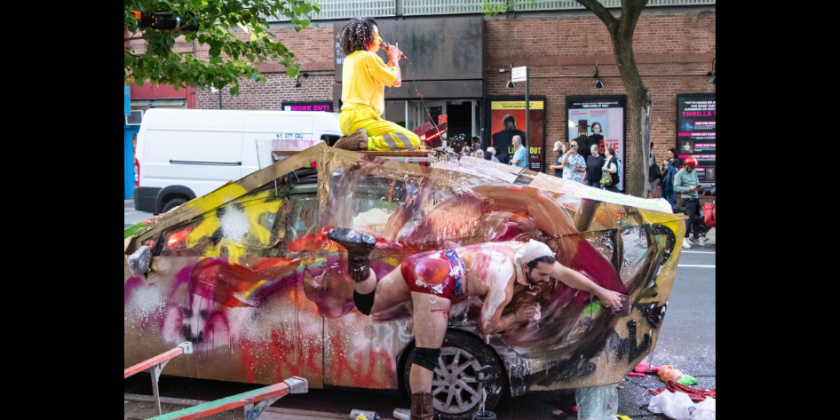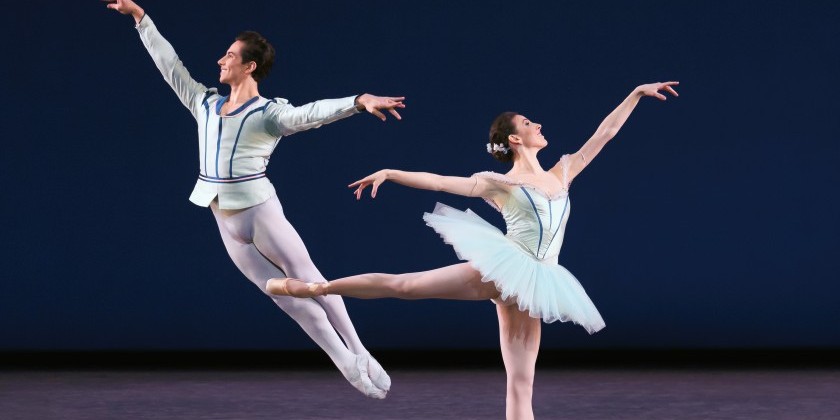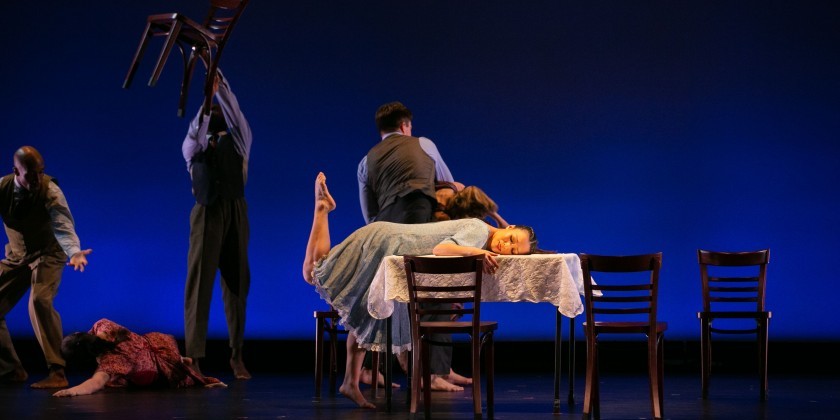IMPRESSIONS: Germany’s tanzmainz Performs Sharon Eyal’s Award-Winning "Soul Chain" at The Joyce

Choreographer: Sharon Eyal
Assistants to the Choreographer: Rebecca Hytting, Tom Weinberger
Co-Creator: Gai Behar
Composer: Ori Lichtik
Costume Designer: Rebecca Hytting // Stage and Lighting Designer: Alon Cohen
Rehearsal Director: Natalia Rodina
tanzmainz Director: Honne Dohrmann
Dancers: Elisabeth Gareis, Daria Hlinkina, Cassandra Martin, Nora Monsecour, Amber Pansters, Maasa Sakano, Marija Slavec-Neeman, Milena Wiese, Zachary Chant, Paul Elie, Finn Lakeberg, Christian Leveque, Federico Longo, Cornelius Mickel, Jaume Luque Parellada, Matti Tauru, Alberto Terribile
January 24-28, 2023

Not easy to endure, Israeli choreographer Sharon Eyal’s daunting Soul Chain, a 55-minute, large-ensemble work, wields extreme visceral impact. Commissioned by tanzmainz, the contemporary dance company of Germany’s Staatstheater Mainz, the intriguing 2017 piece won the German Theatre Prize DER FAUST in 2018, and was recently performed by tanzmainz in the company’s impressive Joyce Theater debut from January 24 - 28. Watching this powerful piece unfold is an indelible experience.

It begins with a pair of dancers way up on the balls of their feet, ankles fully extended, knees loose, torsos stiffly vertical, making their way diagonally across the stage with baby steps. Their stylized struts suggest runway models in super-high heels, and evoke vogue-ing sensibilities. Gradually, as more dancers cross the space, angular arm gestures and spine twists are added to the tiptoe walking, a thematic element shared by everyone. The tiny footfalls land solidly on the relentless beat of a formidable electronic score, composed by Ori Lichtik. After a few minutes, I was already feeling the fatigue surely developing in the dancers’ calf muscles. Little did I know, the marathon had just begun. As the piece progresses, the insistent beat proves inescapable and demands the dancers walk in this manner throughout, granting reprieves for flat-footed movement passages only now and again.
Costumed by Rebecca Hytting, in thin, pale-beige leotards, the dancers appear as a tribe, individuals of varying heights and genders, yes, but in essence more kindred than distinctive. They typically move in stunning unison with sharp, intensely-energized, animalistic actions, all of which become recognizable thematic vocabulary. They like to squat down (still up on their toes) and twist their knees from side to side, alternate forward and backward crossing-over steps, as if doing a Latin ballroom-dance figure, or bring a hand up to the forehead, salute-like, and lift their knees as though marching in a military parade. Sometimes they do little punches, resembling a boxer’s face-protecting jabs. At one point their rhythmic steps transform into ballet bourrées, as they raise one rounded arm overhead and tilt the body in classical line. Yet these abstracted allusions are so artfully light-handed that one is free to read them as referential or, just as easily, not.

Like so many of today’s most inventive contemporary choreographers, Eyal started as a member of Israel’s Batsheva Dance Company, as a performer from 1990-2008 and as a House Choreographer from 2005-2012. Evolving her signature stylishly grotesque movement aesthetic, she went on to create works for an international array of companies, including Nederlands Dance Theater, Royal Swedish Ballet, Hubbard Street Dance Chicago, and her own troupe L-E-V, launched in 2013. With Soul Chain Eyal is clearly asking us to think about individual existence vis a vis a group dynamic.
Choreographically, the piece is crafted as a series of seemingly endless repetitions of a single movement. It’s painful to watch the dancers execute the same move repeatedly, and to sense how draining it is on their bodies. Yet we are simultaneously ensnared by the physical endurance on display. Interestingly, there is always a dancer who separates from the group and moves independently, off on their own, dancing wildly, sometimes as if crazed, or simply free. Twice within the work, a couple sets itself apart from the others and almost seems to be sharing something. Yet neither dancer’s movements change or grow as a result of being together, so we see no evidence of a real relationship.

Program notes inform us that Soul Chain is about love, but I didn’t feel it. Holding abundant muscular tension in their bodies, the dancers communicate severe constraint. And there’s an absence of breath, no indication of natural inhales or exhales — hence, no released feelings or emotional expression. Only once does the choreography suggest any sort of liberation. One by one women take running dives into the outstretched arms of two rows of men who then toss them high up into the air. The episode is undeniably exciting, but seems not to belong in this piece.

While rivetingly performed by tanzmainz (under the artistic direction of Honne Dohrmann), the work grows harder to watch as time wears on. By the end, my calves were screaming in (sympathetic) pain as, dripping with sweat, their costumes marked by huge wet patches, the dancers pushed the limits of their physicality. I felt suffocated by the loud reverberating music, and nauseated by the closing image of a pulsating central figure jerking his upper body in a sideways motion, sending his skull flopping atop his spine again and again — literally hundreds of times! You could sense his neck muscles tiring and imagined him a bobblehead doll whose head would soon break off. I tried to focus on the movements of the dancers behind him, as they clumped together bathed in refreshing rays of white light from above until, finally, it was over. I was thoroughly exhausted, okay maybe a bit exhilarated, and certainly not ungratified.







